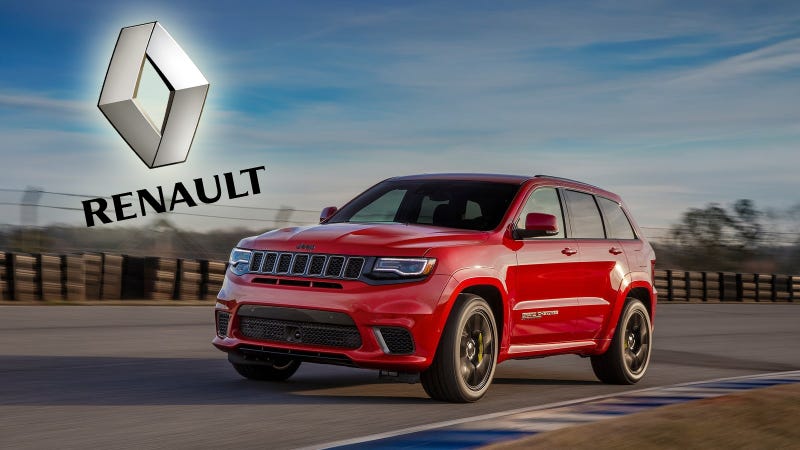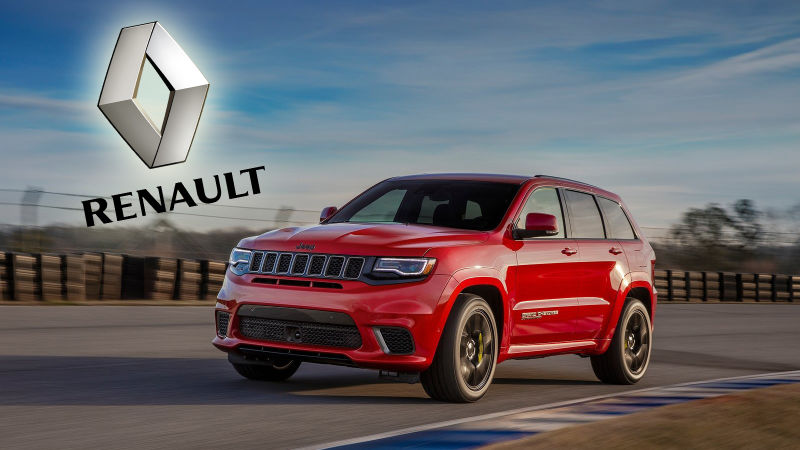
A few years ago, then-Fiat Chrysler boss Sergio Marchionne seemed desperate to merge or partner his conglomerate with someone—anyone. He saw a future where every car company made its own individual models, engines, transmissions, parts and more as increasingly wasteful. That’s even more true with the huge capital investments required for electrification and autonomy. Well, Marchionne may be gone in 2019, but his dream is inching closer to reality.
Fiat Chrysler today officially confirmed the wild reports we heard over the weekend: It is formally proposing a 50/50 merger with France’s Groupe Renault, a move that would create the world’s third-largest automaker by production.
An announcement on FCA’s website touted the merger as a chance to save €5 billion a year in synergies, merge platforms and powertrains and dump capital into EVs and other new technologies. It also said no plant closures would be needed.
From the announcement:
The proposed combination would create a global automaker, preeminent in terms of revenue, volumes, profitability and technology, benefitting the companies’ respective shareholders and stakeholders. The combined business would sell approximately 8.7 million vehicles annually, would be a world leader in EV technologies, premium brands, SUVs, pickup trucks and light commercial vehicles and would have a broader and more balanced global presence than either company on a standalone basis.
The benefits of the proposed transaction are not predicated on plant closures, but would be achieved through more capital efficient investment in common global vehicle platforms, architectures, powertrains and technologies. FCA has a history of successfully combining OEMs with disparate cultures to create strong leadership teams and organizations dedicated to a single purpose. Therefore, FCA’s Board strongly believes that this combination, which would have the scale, expertise and resources to navigate the rapidly changing automotive industry, would create new opportunities for employees of both companies and for other key stakeholders.
Advertisement
Under this plan FCA and Renault would merge, and that would put FCA as a new partner in the existing “alliance” with Nissan and Mitsubishi. The Wall Street Journal says Renault Chairman Jean-Dominique Senard is envisioned as CEO of the combined company.
The Japanese companies have been allied with Renault for years now but are not formally merged, though there has been some talk of that, albeit the kind that was met with strong resistance on the Nissan side and may have contributed to the downfall of former alliance boss Carlos Ghosn.
(As a side note: Would this proposal had come forward if Ghosn hadn’t been deposed? I’m legitimately not sure.)
Advertisement
Here’s more on what could happen with Nissan from the Journal, which notes Nissan’s serious financial troubles as of late:
Renault approached Nissan last month to propose a full-blown merger between the two, but was rebuffed. A merger between Fiat and Renault would shelve those plans, said a person familiar with the Fiat-Renault deal.
“Nothing is going to happen on the alliance side for a while,” the person said. “Nissan has to get its house in order first.”
Advertisement
Needless to say, this is pretty huge news, but it’s also not the first time some of Fiat Chrysler’s brands and Renault have had a tie-up. Renault partnered with American Motors Corporation in the late 1970s, which included the Jeep brand at the time, before its shares were bought out by Chrysler about a decade later. What’s old is new again.
In recent years and months there’s been talk or informal proposals of FCA partnering with General Motors (it was quickly rebuffed), Peugeot and, yes, Renault. While FCA struggles in certain sectors it has some extremely strong performing brands, most notably Jeep, which perhaps the most potentially lucrative car brand on earth—and Ram. Here are some examples of the possible synergies from FCA’s proposal:
Combining the businesses will bring together complementary strengths. The combination would create a brand portfolio that would provide full market coverage with a presence in all key segments from luxury/premium brands, such as Maserati and Alfa Romeo, to the strong access brands of Dacia and Lada, and would include the well-known Fiat, Renault, Jeep and Ram brands as well as commercial vehicles. Groupe Renault has a strong presence across Europe, Russia, Africa and Middle East, while FCA is uniquely positioned in the high margin segments in North America and is a market leader in Latin America.
FCA’s evolving capability in autonomous driving, which includes partnerships with Waymo, BMW and Aptiv, is complemented by Groupe Renault’s decade of experience in EV technology where it is the highest selling EV OEM in Europe. Groupe Renault also has a well-established and profitable financing business (RCI Banque).
Advertisement
Will Renault agree to it? For now it says it’s just studying the plan, but expect the existing alliance with the Japanese automakers and Renault’s own partial ownership by the French government to make this more complicated than it would be otherwise.
But given slumping new car sales in China and the U.S., massive costs needed for future technologies and a possible economic downturn on the horizon, expect more merger proposals like this one in the future—and ones that actually happen.













